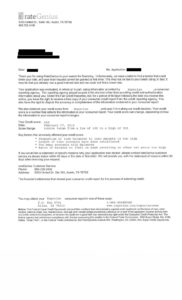See Loan Denial Letter below, this person has an 849 Fico score, GREAT CREDIT, and still denied for a loan. Credit score is a major factor, but it’s not the only thing lenders consider. Your income, amount of debt and type of employment can also trigger rejection.
If you’re in the market for a loan, you’ve probably spent a lot of time and energy on improving your credit. This is a wise move, because your credit score is one of the major factors banks consider when deciding whether to lend to you.
However, it’s not the only factor. If you have great credit but still got denied for a loan, here are three possible reasons:
• Your income is too low for the amount that you want to borrow.
• Your Debt-to-income ratio is too high.
• Your self-employed or make an irregular income.
1. Your income is too low for the amount you want to borrow
If you’re trying to get a mortgage, you probably noticed that your potential lender is gathering a lot of financial information about you. One data point it’s particularly interested in is your income; it needs it to calculate your housing expense ratio to be sure that your monthly mortgage payments will be affordable.
The housing expense ratio is determined by a simple math problem: monthly mortgage payment (including taxes and insurance) divided by your gross monthly income. Let’s use the following as an example: You’re a prospective homeowner making $50,000 per year. You’re interested in a home with a monthly payment that would add up to $1,000:
$50,000/12 = $4,166.67 (this is your gross monthly income)
1,000/4,166.67 = 24% (this is your housing expense ratio)
Usually, lenders like to see a borrower’s housing expense ratio fall below 28%. If you’re looking at a home that costs too much relative to what you’re making, the lender could deny you the loan.
To solve this problem, take a hard look at the income you reported to the lender — does it include what you’re making from your side business or extra job? If not, speak up; all sources of income are considered. Alternately, you might need to adjust your home search to focus on places that are a bit less expensive.
2. Your debt-to-income ratio is too high
When you’re applying for any type of loan, your bank is going to carefully examine your debt-to-income ratio. This is a measure of how much you’re paying out in monthly obligations relative to your income. To figure out your DTI, simply add up your monthly payments (including rent or current mortgage, auto loan, and minimum credit card and student loan payments) and divide by your gross monthly income.
Banks tend to view borrowers with a DTI of 36% or higher as a risk. Having too many obligations means you might be in over your head.
Let’s use the following as an example: You’re making $50,000 per year. Your monthly payments include a $1,000 mortgage payment, a $250 car loan payment and a $250 student loan payment.
$1,000+$250+$250 = $1,500 (this is the total of your monthly obligations)
$50,000/12 = $4,166.67 (this is your gross monthly income)
$1,500/$4,166.67 = 35.9% (this is your DTI)
In general, lenders like to see a total DTI of 36% or less. If your DTI is higher (or taking on a new loan will push you above the 36% threshold) you could be denied a loan. This is because banks tend to view borrowers with a DTI of 36% or higher as a risk; having too many obligations means that you might be in over your head and might miss payments.
To reduce your DTI, consider paying off some of your existing debt. This will make the loan application process much smoother.
3. You’re self-employed or make an irregular income
Most banks like to see a strong history of income and employment before granting a loan; this is especially true if you’re shopping for a mortgage. If you have a traditional office job, this might not be a problem. But for folks who are self-employed or have an irregular income, qualifying can be more difficult.
Again, lenders don’t like making risky loans. Even if you have a great history with paying your bills on time and in full, if the bank thinks there’s a likelihood that you could lose your income, you might get denied.
In this case, your best offense is a good defense. Keep meticulous records of your income and employment history, and be prepared to turn over lots of tax documents to prove you’re a good earner. If you’re trying to purchase a home, offering a big down payment might also help to grease the wheels.




